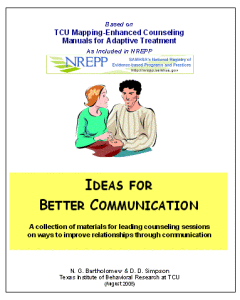
About this intervention
TIC-Communication focuses on improving relationships. Communication needs may easily take a back seat to more urgent rehabilitation demands within the criminal justice system, but positive communication within relationships serve as a vital tool for improving client morale and performance. The 4 sessions of this intervention address the concepts of “making amends,” forgiving and letting go of resentments, and learning to distinguish between healthy supportive relationships versus unhealthy enmeshed ones. Participants are encouraged to build “connections” with others, develop effective listening and problem solving skills, and are challenged to break down destructive relationship roadblocks. Sections of the intervention include Communication Roadblocks, Repairing Relationships, Communication Styles, Mapping Worksheets, and Links of Interest. This intervention includes a collection of materials for leading counseling sessions on ways to improve relationships through communication.
Modular applications in this manual include:
- Communication Roadblocks is part of the Straight Ahead: Transition Skills for Recovery intervention developed at TCU. This session features a leader’s script, with notes and handouts for leading a solution-focused or strengths-based discussion of dealing with perceptions that interfere with communication. Participants are invited to think about things they do and are aware of in others that get in the way of effective communication. Materials for a “mini-lecture” highlight healthy and unhealthy reactions to communication problems. Guidelines for leading an exercise to improve listening also are included.
- Repairing Relationships provides worksheets and group leader instruction for facilitating a session on strategies to examine and begin to repair past relationship problems, including listing and reflecting on specific issues. Taken from a core set of materials developed by Matrix, Inc. (at UCLA), and adapted by NDRI, the intervention features an informational handout for participants as well as leader questions designed to encourage discussions about the situational aspects of communication problems.
- Communication Styles is adapted from the Straight Ahead: Transition Skills for Recovery intervention developed at TCU. This session features a leader’s script, with notes and handouts for leading a discussion on different communication styles and their impact on relationships. Participants are invited to think about communication habits that can get in the way of sustaining healthy relationships. Materials for a “mini-lecture” highlight problems that arise from passive and aggressive communication. Brief role-plays are used to help participants identify aspects of different communication styles.
- Mapping Worksheets — These Mapping Worksheets were selected from the intervention TCU Guide Maps: A Resource for Counselors because of their specific focus on relationships and communicating with others. Each mapping worksheet follows a “fill in the blank” format to encourage participants to consider various cognitive aspects of how we communicate and manage problems with others. Once participants complete their worksheet, group discussions and commentary on the causes and effects of communication problems and strategies for overcoming unproductive habits are facilitated.
- Links of Interest — Websites featuring materials on anger.
The Ideas for Better Communication intervention may be freely used for personal, educational, research, and/or information purposes only. Permission is hereby granted to reproduce and distribute copies of content material (except reprinted passages from copyrighted sources) for nonprofit educational and nonprofit library purposes, provided that copies are distributed at or below costs and that credit for author and source are included on each copy.
No part of any material may be copied, downloaded, stored in a retrieval system, or redistributed for any commercial purpose without the expressed written permission of Texas Christian University.
Recommended Citation: Bartholomew, N. G., & Simpson, D. D. (2005). Ideas for better communication. Fort Worth: Texas Christian University, Institute of Behavioral Research. Available: the IBR Website: www.ibr.tcu.edu